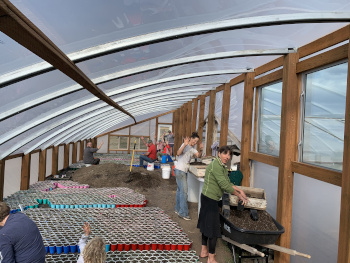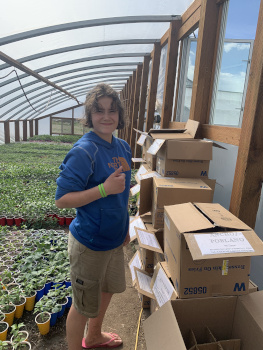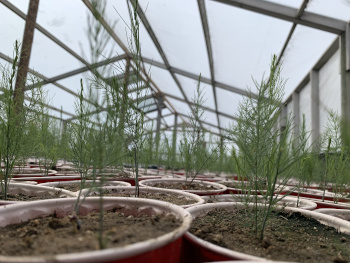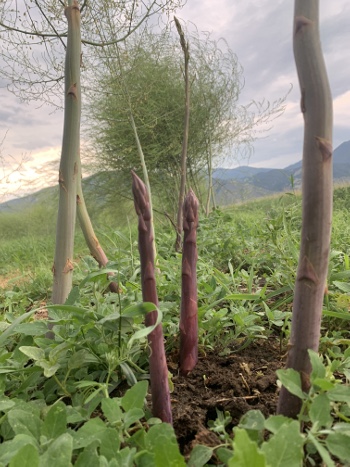|
|
| |
| Who is Ready for Heat?
March 30
 
Hello Farm Friends!
Two early projects are complete!
The asparagus has been mowed and prepped for the annual cultivation. It's the last step that kicks off our asparagus harvest season. Also, a whirlwind weekend of the first wave planting is now complete in the greenhouse. It was a long weekend, but the first 6000 plants are all transplanted into their individual homes till outdoor planting season arrives.
Special thanks to our helpers over the last few days who helped us finish these tasks! I have attached two pictures to show off the progress in both the asparagus field and greenhouse. It looks great.
The Heat is ON
It may seem a bit weird to drive to the farm during March prepared to work in the heat, but that is the reality in the greenhouse this time of year.
Yes, water bottles, sunglasses, shorts, hats, and sandals will be perfect for the upcoming greenhouse projects. Summer temps feel extreme this time of year while we Montanans are coming out of the cold winter months and expecting chilly spring days. It's a bit of a shock when you walk into the greenhouse running at 80-90 degrees! Just so you know...
Now we take a pause while the plants grow and while we prepare a big greenhouse work project. The weekend of April 10-11 and April 17-18 will be a sort of "all hands on deck" time for our weeding cycle. We can use lots of hands to make the work easy, and it is a perfect time to plan a bonfire social for when the work winds down. I will update you more on the details of these work days as they get closer, but I mention it now for you to know what is coming next.
Weeds = Healthy, Living Soil
The reason we have to pull weeds in our seedlings is because we use live soil for all of our plants. The commercial method uses a sterile soil mix to start seedlings due, in large measure, to the inconvenience of weeds. This shortcut of starting with sterile soil saves labor, but it is a shortcut that degrades the quality and strength of regenerative garden seedlings.
Sterile soil has been treated to kill the biotic life and prepare for synthetic chemical feedings. This is the commercial process, but the shortcut leaves much to be desired in the overall health of the plants that are ultimately the source for your garden food. We are willing to go the extra mile and work with live soil even though it requires an extra labor step to pull weeds. The difference for the plants growing in live soil is amazing. Even the exposure to weed pressure at that early age strengthens them for dealing with weeds out in the garden during their season to come.
Sometimes, excellence requires extra work, but those who understand the importance of soil life, health, and regenerative methods will appreciate the results healthy growing provides. You simply cannot increase health by starting with dead, sterile soil.
Stay tuned for details about April 10-11 and April 17-18 work days!
Waiting for the Alarm Clocks to Go Off
The timing of the asparagus harvest season will depend on the weather to come. How does the asparagus know when to wake up out of it's long sleep? What makes the alarm clock go off for the time of harvest season?
The short answer to that question is soil temperature. It is the alarm clock that kicks the asparagus out of bed and up toward the sky.
Asparagus will begin to wake up out of dormancy when the soil temperature reaches about 52 degrees, more or less. And remember, the crown is about a foot deep, so it would be the temperature at that depth, not just the surface soil temperature.
The genius of this biological process is that it doesn't matter where the asparagus grows. It doesn't matter if it happens to live in a place with a short winter, or a place with a long winter (like Montana). The alarm clock process works everywhere.
It gets a bit more interesting, too, because each individual asparagus plant has its own personality with that alarm clock. Some wake up and rocket straight to the surface. Other plants roll over and snooze a bit before they get rolling. Some don't get out and rolling until "lunchtime" as it were. It seems like each individual plant has its own personal alarm clock. Even asparagus seeds germinate on their own time as they see fit. It's remarkable.
And here is a great lesson about variation and diversity. Try to do a thought experiment: What would happen if all the asparagus plants happened to be exactly the same? What if they all woke up in absolute uniformity and at the exact same moment? Well, the entire asparagus season would be about a week long (or less!) with an overwhelming crop coming all at once rather than a harvest season spread over 5-6 weeks. It's the variation and diversity of asparagus personalities that provide a long and manageable harvest for humans. It is variation and diversity within the asparagus plants that makes the farm economics viable.
It shows you exactly why variation and diversity are crucial to life. Now imagine another thought experiment: What would happen if all humans happened to be exactly the same? What would the world look like if everyone was exactly like you? Would that be a horrific thought? Or would that be a prospect of heaven? The answers to these questions reveal a lot about human psychology and worldview.
If you thought about it for very long, that would be a terrible world to live in. Without variation and diversity, life as we know it would not exist. How would everything get done if everyone you ran into was you? There may be a few people governed by egotistical concepts who actually think it would be fantastic if everyone thought exactly like they do, believed as they do, prioritized like they do, worked like they do, politicked the way they do. A few might think that is heaven -- everyone is just like me!!!!
Yet a thought experiment like that reveals the problem of ego-mania which views variation and diversity as an enemy of ideological and cultural progress. The reality that the biological world shows is that variation and diversity is one key support for bountiful life. Diversity is a friend to cultivate, not an enemy to vanquish. Balance is a key element of productive life. That is what the biological world teaches for those who listen.Now we wait on all those alarm clocks to go off and start the fresh asparagus season for us!Random Rain DaysMy work schedule is heavily dependent on good weather. As we come into the traditional rain season for Montana, there may be short notice for days that will become work days in the greenhouse. It's a great place to go when the weather turns bad. Work continues on random rain days.When the forecast says I will be heading into the greenhouse for a day or more due to rain, I will send out a short notice for others to join me if they wish. Stay tuned for that opportunity to join up with greenhouse projects underway.In the meantime, I would recommend a recent documentary to help you understand the basic principles that govern our growing at Covenant Gardens. If you have a rain day, a free evening, or just some down time and want to learn from an excellent presentation, please check out the movie Kiss the Ground. It is also available on Netflix. This documentary is well worth your time, entertaining, encouraging, and supremely educational. I highly recommend it for everyone, but especially for our Farm Friends who want to understand some key priorities and goals here at Covenant Gardens.Can't wait to see you soon, and meet some more new Farm Friends in 2021. The season is long and the opportunities will keep coming, so just let me know when it works for you to join us for a work day, harvest day, or farm party. Stay tuned!Blessings,Tim MartinCovenant GardensCovenatGardens.com
 
|
|
|
|
|
|

